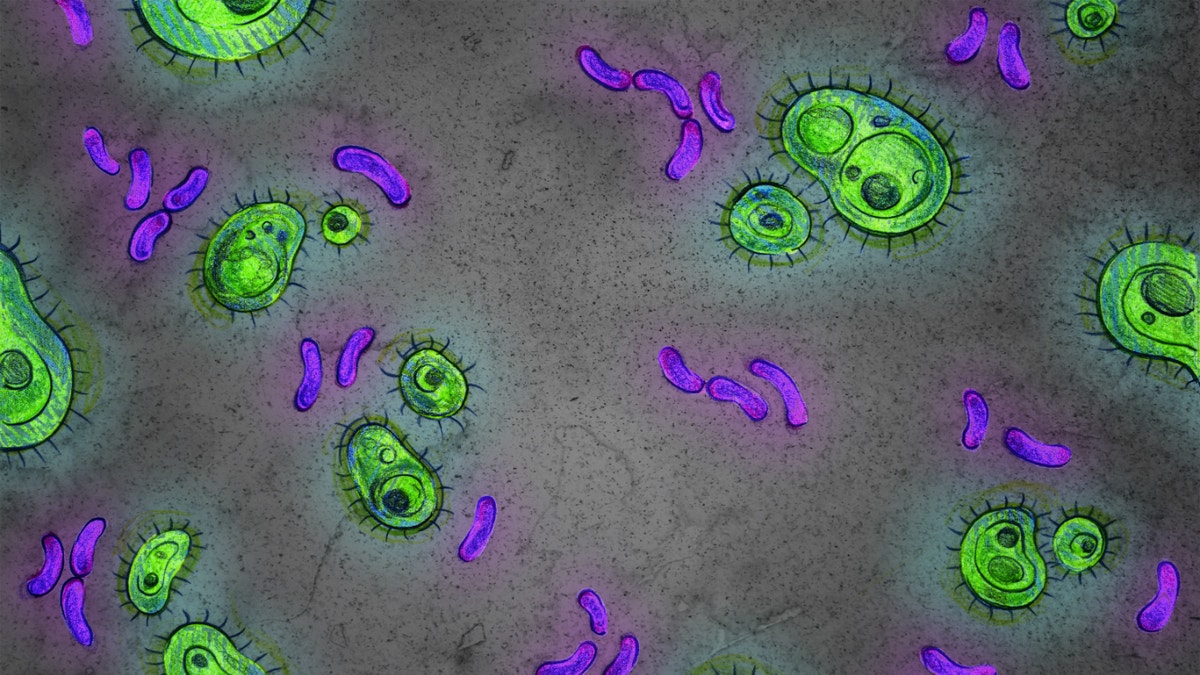
An artist's rendition of bacteria that live in the gut of people and their closest relatives. A new study finds that these microbes have lived — and evolved — with us since before we were human. (The University of Texas at Austin. Illustration by Jenna Luecke.)
The relationship between humans and the bacteria in our guts extends far back into the past — to the time before modern humans even existed, a new study finds.
Microbes in two bacterial families — Bacteroidaceae and Bifidobacteriaceae, which are present in humans and African apes — likely colonized the guts of a shared ancestor of both groups around 15 million years ago, the researchers discovered.
Since then, the bacteria have inhabited the digestive systems of humans and apes for thousands of generations. [Body Bugs: 5 Surprising Facts About Your Microbiome]
The researchers' genetic data also tell a story of parallel evolution — in the microbes, and in the primate hosts they inhabited.
"Just like we share a common ancestor with chimpanzees about 6 million years ago, a lot of our gut bacteria share a common ancestor with chimpanzee gut bacteria, which diverged around the same time," said study co-author Andrew Moeller, a postdoctoral researcher at the University of California at Berkeley.
"And the same is true for human and gorilla gut bacteria. We share a common ancestor maybe about 15 million years ago, and we found that some of our gut bacteria shared common ancestry about the same time," Moeller said in a statement.
Recent research has shown that humans' complex communities of gut microbes may influence our immune systems, and may be associated with certain moods and behaviors.
This new study provides the first evidence of when in our evolutionary history those microbes may have colonized us, the researchers said.
Previous findings enabled the researchers to identify an animal species purely from the groups of microbes in their gut, study co-author Howard Ochman, a professor of integrative biology at the University of Texas at Austin, said in a statement.
"If you were to give me a sample that came from chimpanzees, I could easily distinguish them from those that had come from human populations," Ochman said.
However, earlier analysis of gut microbes in humans and apes could only compare the overall diversity of their bacterial communities. In the new study, researchers identified individual types of bacteria. By comparing bacteria between humans and apes — chimpanzees, bonobos and two subspecies of gorillas — the researchers trace their lineages of bacteria through time.
Numerous studies have shown that many factors affect the bacterial diversity in the human gut, including people's diet, geography and medical history. The new findings suggest that evolution may have played a more important role in establishing some of these microbial partners than previously thought.
"Just like our genes are passed down every generation, some of our gut bacteria have been passed down in an unbroken line of descent for a really long time," Moeller said.
The findings were published online today (July 21) in the journal Science.
Original article on Live Science.
Editor's Recommendations
- 11 Surprising Facts About the Digestive System
- 5 Ways Gut Bacteria Affect Your Health
- What's in Your Gut? 3 Bacterial Profiles Defined
Copyright 2016 LiveScience, a Purch company. All rights reserved. This material may not be published, broadcast, rewritten or redistributed.
